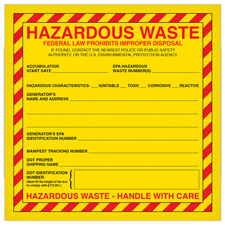| The Home page of ILPI's Safety Data Sheet (SDS) Resource, the leader in SDS information since 1995! | |
| The history and philosophy behind this resource. | |
| A curated collection of books and reference materials concerning Safety Data Sheets and closely related topics. | |
| Paste your plain text SDS into the SDS-Demystifier, and it will be converted into a hypertext-enriched document with links to detailed explanations of each key term. | |
| An extensive list of frequently asked questions about Safety Data Sheets including regulations, content, compliance, and more. | |
| A humorous take on Safety Data Sheet jargon. Fill in the blanks on our entry form to generate a personalized Unsafety Data Sheet to share with your coworkers. | |
| Since 1995, we've maintained this massive curated list of the best places to find Safety Data Sheets on the Internet. | |
| Way more than a glossary, this hypertext-enhanced resource covers hundreds of SDS-related terms and expert knowledge. Each entry includes both the SDS relevance and links to additional authoritative resources. | |
| Archived results of Safety Data Sheet related polls taken by some of our millions of site visitors | |
| You are here! The OSHA regulations behind SDS regulations, including the inspection guidelines and over 400 official interpretations letters under the Hazard Communication Standard | |
| Commercial suppliers of SDS authoring and management software as well as cloud compliance services. | |
| Commercial companies that will create SDS's for your specific needs as well as SDS translation companies. |

Safety signs, banners, and scoreboards? Get yours at Safety Emporium!
| Title: 05/20/2019 - HAZCOM's hazardous waste exemption as related to EPA's universal wastes | |
| Record Type: Interpretation | Standard Number: 1910.1200(b)(6)(i) |
OSHA requirements are set by statute, standards and regulations. Our interpretation letters explain these requirements and how they apply to particular circumstances, but they cannot create additional employer obligations. This letter constitutes OSHA's interpretation of the requirements discussed. Note that our enforcement guidance may be affected by changes to OSHA rules. Also, from time to time we update our guidance in response to new information. To keep apprised of such developments, you can consult OSHA's website at https://www.osha.gov.
May 20, 2019
Ms. Kelly V. Camp
Woodard & Curran
33 Broad Street
One Weybosset Hill, Floor 7
Providence, Rhode Island 02903
Dear Ms. Camp:
Thank you for your letter to the Occupational Safety and Health Administration (OSHA). Your letter was referred to OSHA's Directorate of Enforcement Programs for a response. You have questions related to OSHA's Hazard Communication standard (HCS), 29 CFR 1910.1200. This letter constitutes OSHA's interpretation only of the requirements discussed and may not be applicable to any question not delineated within your original correspondence. Your paraphrased questions and our responses are below.
Background: You have noted in your letter that 29 CFR 1910.1200(b)(6) states: "This section does not apply to: (i) Any hazardous waste as such term is defined by the Solid Waste Disposal Act, as amended by the Resource Conservation and Recovery Act of 1976, as amended (42 U.S.C. 6901 et seq.), when subject to regulations issued under that Act by the Environmental Protection Agency."
Question 1: Does the HCS apply to universal waste, which is included within the definition of hazardous waste and subject to 40 CFR 273?

Get your hazardous waste labels from Safety Emporium.
Response: No. As noted in the background section, per 29 CFR 1910.1200(b)(6)(i), the HCS does not apply to hazardous wastes regulated by the U.S. Environmental Protection Agency (EPA) under the Resource Conservation and Recovery Act (RCRA). When waste does not meet the definition of "hazardous waste" under the RCRA regulations, it is covered by the HCS if it meets the standard's definition of "hazardous chemical" at 29 CFR 1910.1200(c), and if it does not fall under any of the other HCS exemptions.
RCRA defines "hazardous waste" as "solid waste, or combination of solid wastes, which, because of its quantity, concentration, or physical, chemical, or infectious characteristics may — (A) cause, or significantly contribute to an increase in mortality or an increase in serious irreversible, or incapacitating reversible, illness; or (B) pose a substantial present or potential hazard to human health or the environment when improperly treated, stored, transported, or disposed of, or otherwise managed." 42 U.S.C. § 6903(5). "Solid waste" is defined under RCRA as garbage, refuge, sludge, "and other discarded material." 42 U.S.C. § 6903(27).
Question 2: Some states regulate additional waste as universal wastes (e.g., oil-based finishes in New Jersey). Is universal waste subject to state regulations only included within the definition of hazardous waste, such that universal waste is not subject to the HCS?
Response: No. The HCS exemption under 29 CFR 1910.1200(b)(i) covers only universal waste that is defined by RCRA regulations as hazardous waste. The exemption does not extend to universal waste subject only to state regulations.
Thank you for your interest in occupational safety and health. We hope you find this information helpful. OSHA's requirements are set by statute, standards, and regulations. Our letters of interpretation do not create new or additional requirements but rather explain these requirements and how they apply to particular circumstances. This letter constitutes OSHA's interpretation of the requirements discussed. From time to time, letters are affected when the Agency updates a standard, a legal decision impacts a standard, or changes in technology affect the interpretation. To assure that you are using the correct information and guidance, please consult OSHA's website at www.osha.gov. If you have any further questions, please feel free to contact the Office of Health Enforcement at (202) 693-2190.
Sincerely,
Patrick J. Kapust, Acting Director
Directorate of Enforcement Programs
The original official public domain version of this document is available from OSHA at https://www.osha.gov/laws-regs/standardinterpretations/2019-05-20.